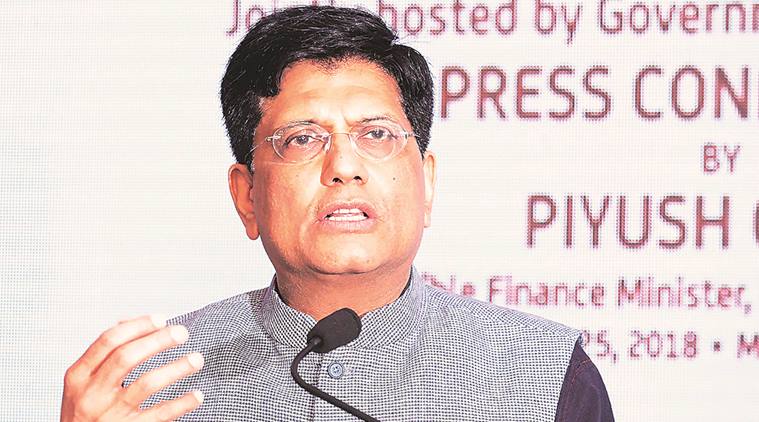Piyush Goyal: India will need $750 billion up to 2022 for infrastructure
Holding inclusive growth as the key element, Goyal said there is a need to develop faster processes for loan disbursement as India is a leading emerging economy and favoured investment destination.
 Finance Minister Piyush Goyal. (Express photo/Nirmal Harindran)
Finance Minister Piyush Goyal. (Express photo/Nirmal Harindran)
Finance Minister Piyush Goyal on Tuesday said India will need $750 billion for energy, transportation and urban development during the five-year period up to 2022.
“Over the five-year period of 2017-2022, India will need $750 billion for energy, transportation and urban development and we have budgeted infrastructure spending $90 billion for 2018-19. AIIB will be an important pillar in meeting this requirement,” Goyal said while addressing the annual meeting of Asian Infrastructure Investment Bank (AIIB).
 “The newly emerging institutions have the potential to redefine the contours of multilateral financing and set new rules for engagement. Multilateralism has helped the world achieve inclusive economic growth across countries at different stages of development. We need to strengthen the multilateral cooperation to help us meet the challenges of climate change, economic slowdown in some parts of the world and rising protectionism,” he said.
“The newly emerging institutions have the potential to redefine the contours of multilateral financing and set new rules for engagement. Multilateralism has helped the world achieve inclusive economic growth across countries at different stages of development. We need to strengthen the multilateral cooperation to help us meet the challenges of climate change, economic slowdown in some parts of the world and rising protectionism,” he said.
Holding inclusive growth as the key element, Goyal said there is a need to develop faster processes for loan disbursement as India is a leading emerging economy and favoured investment destination.
AIIB chief cautions on protectionism
Asian Infrastructure Investment Bank (AIIB) president Jin Liqun on Tuesday cautioned that protectionism practiced by some countries is likely to dim the prospects for all countries in the world, including themselves.
“I urge some developed countries to resist protectionism and remain open, and developing countries to continue opening up,” Liqun said at the AIIB annual conference. “Looking at the prospects for developing Asia, I would ask-will we continue to have an open global trading system or will the world retreat into protectionism?”
“ … we must rejuvenate and rethink those systems which may be weakening to find a path forward in the 21st Century-the Asian Century. We must also revitalise the global economic institutions. The global economic order is precious, but imperfect,” he said.





- 01


























